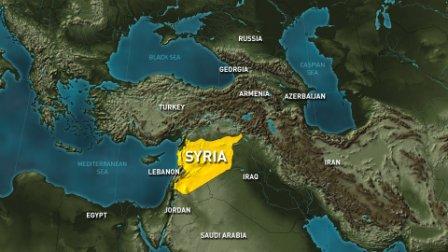 High-stakes diplomacy unfolded Friday in Geneva, Switzerland, over the long-running Syrian crisis.
High-stakes diplomacy unfolded Friday in Geneva, Switzerland, over the long-running Syrian crisis.
Secretary of State John Kerry and Russian Foreign Minister Sergey Lavrov continued discussions about Moscow's initiative to control, remove and destroy Syria's chemical weapons.
Success in those discussions on chemical weapons could jump-start an initiative for renewing peace talks. The effort called Geneva II, spearheaded by U.N.-Arab League envoy Lakhdar Brahimi, would be designed to end the Syrian civil war.
LATEST DEVELOPMENTS FRIDAY:
• The president of Oxfam America, the international relief and development organization, regards the Kerry-Lavrov meetings in Geneva as "positive" but regrets that the diplomats failed to set a date "for the elusive Geneva peace conference." "Further delays will only result in more death, displacement and suffering," the group's president, Ray Offenheiser, said.
PREVIOUS DEVELOPMENTS
Chemical weapons
• Speaking at a joint news conference with Lavrov, Kerry on Friday called his conversations with his counterpart on the chemical weapons issue "constructive" and said the talks were continuing.
• Lavrov said a path needs to be designed that "would make sure this issue is resolved quickly, professionally, as soon as practical." He said professionals, the Organization for the Prohibition of Chemical Weapons and the United Nations need to be engaged in the effort.
Peace initiative
• Kerry, Lavrov and Brahimi pledged to work toward setting a date for a second round of international peace talks involving all parties in Syria, known as Geneva II. This would be a continuation of the talks held in Geneva in June 2012.
• Kerry and Lavrov are planning to meet again at the end of September, on the margins of the annual U.N. General Assembly meeting.
Kerry remarks
• Kerry said they will gauge whether it is possible to find a date for a Geneva II conference when they meet around September 28. Forging that conference will "obviously depend on the capacity to have success here in the next day, hours, days, on the subject of the chemical weapons," he said.
• "I would say, on behalf of the United States, that President Obama is deeply committed to a negotiated solution with respect to Syria. And we know that Russia is likewise," Kerry said. "We are working hard to find the common ground to be able to make that happen."
• Kerry said he and Lavrov are concerned about "the acts on both sides, all sides, that are creating more and more refugees, more and more of a humanitarian catastrophe." "We are committed to trying to work together, beginning with this initiative on the chemical weapons, in hopes that those efforts could pay off and bring peace and stability to a war-torn part of the world."
Lavrov remarks
• Lavrov said he regrets that the communique that came out of the June 2012 Geneva meeting was "basically abandoned" and not endorsed in the U.N. Security Council. But he praised Kerry, saying he "understood the importance of moving on Syria and doing something about this."
• Lavrov praised Kerry for traveling to Moscow on May 7 "when we launched the Russian-American initiative to convene a Geneva conference and to implement fully the Geneva communique"
• The communique, Lavrov said, means that "Syrian parties must reach mutual consent on the transitional governing organs which would command full executive authority. And the communique also says that all groups of Syrian society must be represented."
On the ground
• Kerry will travel to Jerusalem on Sunday to meet with Israeli Prime Minister Benjamin Netanyahu, U.S. State Department spokeswoman Jen Psaki said Friday. They will discuss the final-status talks between Israelis and Palestinians but also are to focus on developments in Syria.
• At least 15 people have been killed in the fighting on Friday, the opposition Local Coordination Committees said. Activists report warplanes dropping bombs and government artillery shelling in the Damascus area. Such incidents could not be independently confirmed by CNN.
• The U.N. refugee agency, which has reported millions of Syrians displaced by the civil war, said it has seen a "sharp increase" of Syrians arriving by boat in southern Italy. Most have come from Egypt.
• The Free Syrian Army hopes that its "military supplies will increase in the coming days," Louay Al-Mokdad, the army's political and media coordinator, said Friday. The rebels are issuing guarantees that munitions won't fall into "the wrong hands," such as extremist groups and "undisciplined rebel elements."
• Human Rights Watch issued a report saying Syrian government and pro-government forces executed at least 248 people in the towns of al-Bayda and Baniyas in May. It was one of the deadliest instances of mass summary executions since the start of the conflict in Syria.
CNN's Joe Sterling, Saad Abedine, Hamdi Alkhshali and Samira Said contributed to this report
Portland and Seattle
Free Subscription to Breaking News
Free Subscription to Breaking News





















































































































































































































































































































































